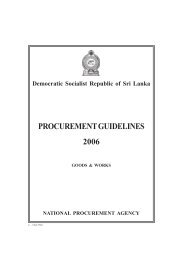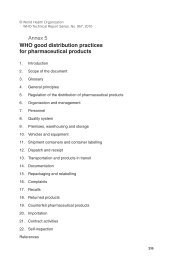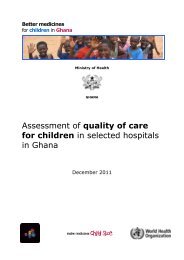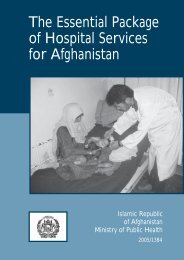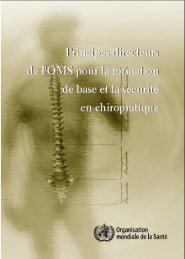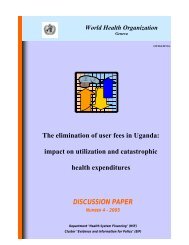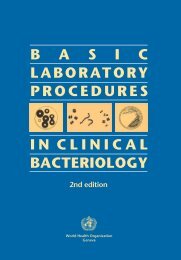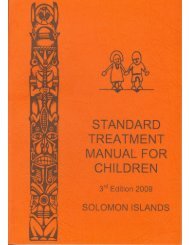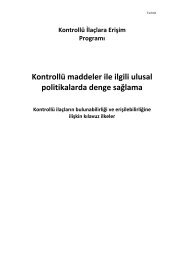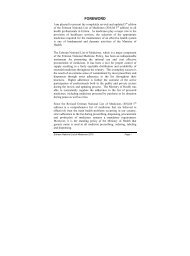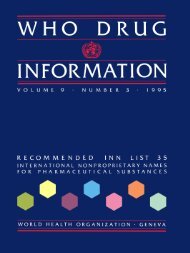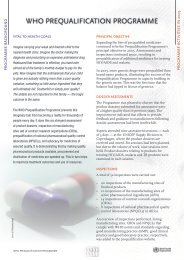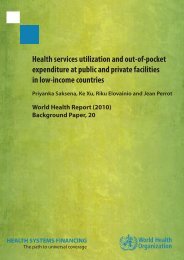WHO Drug Information Vol. 20, No. 1, 2006 - World Health ...
WHO Drug Information Vol. 20, No. 1, 2006 - World Health ...
WHO Drug Information Vol. 20, No. 1, 2006 - World Health ...
You also want an ePaper? Increase the reach of your titles
YUMPU automatically turns print PDFs into web optimized ePapers that Google loves.
Safety and Efficacy Issues<strong>WHO</strong> <strong>Drug</strong> <strong>Information</strong> <strong>Vol</strong> <strong>20</strong>, <strong>No</strong>. 1, <strong>20</strong>06Extracted from the Australian Adverse <strong>Drug</strong>Reactions Bulletin, <strong>Vol</strong>ume 25, Number 1,February <strong>20</strong>06.Reference1. Frans E, Dom R, Demedts M. Pleuropulmonarychanges during treatment of Parkinson’s disease with along-acting ergot derivative, cabergoline. Eur Respir J1992; 5: 263-265.Immune globulin: possibleintravascular haemolysisUnited States of America — The Food and <strong>Drug</strong>Administration (FDA) has requested the manufacturerof an immune globulin product (WinRho®SDF) to address two safety concerns and alertpatients to the early signs and symptoms ofintravascular haemolysis. Symptoms include backpain, shaking chills, fever, discoloured urine,decreased urine output, sudden weight gain, fluidretention/oedema, and/or shortness of breath.Rare, but severe and sometimes fatal, intravascularhaemolysis and its potentially serious complications,including disseminated intravascularcoagulation have been observed. Analysis ofthese events indicates that the aetiology iscomplex and the potential associations are notclearly understood.Important safety information on potentialinterference with blood glucose.<strong>Health</strong>care professionals are also alerted to thepotential for falsely elevated glucose readingswhen using certain blood glucose testing systemsthat are not glucose-specific in patients who havereceived maltose-containing parenteral products.Reference: Communication from Cangene Corporation,Baxter <strong>Health</strong>care Corporation on https://www.accessdata.fda.gov/scripts/medwatch/Aprotinin injection: renal toxicityand ischaemic eventsUnited States of America — Recently publishedarticles (1, 2) have associated aprotinin injectionwith serious renal toxicity and ischaemic events(myocardial infarction and stroke) in patientsundergoing coronary artery bypass graftingsurgery (CABG) or undergoing cardiac surgerywith cardiopulmonary bypass. The Food and <strong>Drug</strong>Administration (FDA) is evaluating these studiesto determine if labelling changes or other actionsare warranted.In the meantime, the following recommendationshave been issued to healthcare providers andpatients:Physicians who use aprotinin injection shouldcarefully monitor patients for the occurrence oftoxicity, particularly to the kidneys, heart, orcentral nervous system and promptly reportadverse event information.Physicians should consider limiting aprotinininjection use to those situations where the clinicalbenefit of reduced blood loss is essential tomedical management of the patient and outweighsthe potential risks.Reference: FDA Public <strong>Health</strong> Advisory, 26 January<strong>20</strong>06. http://www.fda.goBenzocaine sprays andmethaemoglobinaemiaUnited States of America — Benzocaine spraysare used in medical practice for locally numbingmucous membranes of the mouth and throat forminor surgical procedures or when a tube mustbe inserted into the stomach or airways. Theiruse is known to be occasionally associated withmethemoglobinemia. On February 8, <strong>20</strong>06, theVeterans <strong>Health</strong> Administration (VA) announcedthe decision to stop using benzocaine sprays forthese purposes.The Food and <strong>Drug</strong> Administration (FDA) is awareof the reported adverse events and is reviewingall available safety data, but at this time is notplanning action to remove the drugs from themarket. Up until now, the FDA has concluded thatthe number of reported adverse events with thesesprays has been low and, when properly used,these products can help make important proceduresless uncomfortable for patients.Benzocaine sprays used in the mouth and throatcan result in potentially dangerous levels ofmethemoglobinemia. Patients who have breathingproblems such as asthma, bronchitis, or emphysema,patients with heart disease, and patientswho smoke are at greater risk for complicationsrelated to methemoglobinemia and may becandidates for other forms of therapy.Patients who may have greater tendency forelevated levels of methemoglobinemia, such asall children less than 4 months of age and olderpatients with certain inborn defects (such as16



